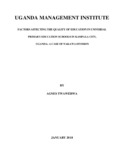FACTORS AFFECTING THE QUALITY OF EDUCATION IN UNIVERSAL PRIMARY EDUCATION SCHOOLS IN KAMPALA CITY, UGANDA: A CASE OF NAKAWA DIVISION
Abstract
This research was about factors affecting the quality of education in universal primary education
schools in Kampala City, Uganda: a case of Nakawa division. The objectives of the study were: to
establish the relationship between UPE input factors and the quality of primary education ; to
analyse the relationship between UPE process factors and the quality of primary education; to
analyse the relationship between UPE school environment factors and the quality of primary
education in Nakawa Division, Kampala City. A descriptive and correlational research design
using both qualitative and quantitative approaches were applied on a population of eighteen UPE
schools, with a sample of two primary schools purposively selected from different parishes to
represent the parishes in Nakawa Division. Two sampling techniques were used, namely,
purposive sampling and stratified random sampling. A sample of one hundred and eighty seven
(187) comprised teachers, pupils, head teachers, SMCs, DEOs, and parish education officers.
Quantitative data on input factors gave a positive significant relationship with r=0.207,
p<0.05(=0.027); on school environment factors also gave a positive significant relationship with
r=0.293, p<0.05(=0.000), unlike quantitative data on the process factors which gave a negative
relationship with r=0.113, p>0.05(=0.161). It was therefore concluded that there exists a positive
significant relationship between UPE input factors and school environment factors unlike process
factors and the quality of primary education in Nakawa Division Kampala City. Thus for quality
primary education, there is need for improvement in the UPE input factors, UPE school
environment factors as well as UPE process factors. In addition, the researcher suggests areas for
further research like teacher’s welfare, assessing the school environment, assessing the external
environment, assessing the quality of curriculum delivery, assessing the quality of management in
the school and the extent to which it contributes to learner’s achievement.

